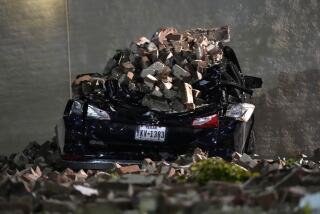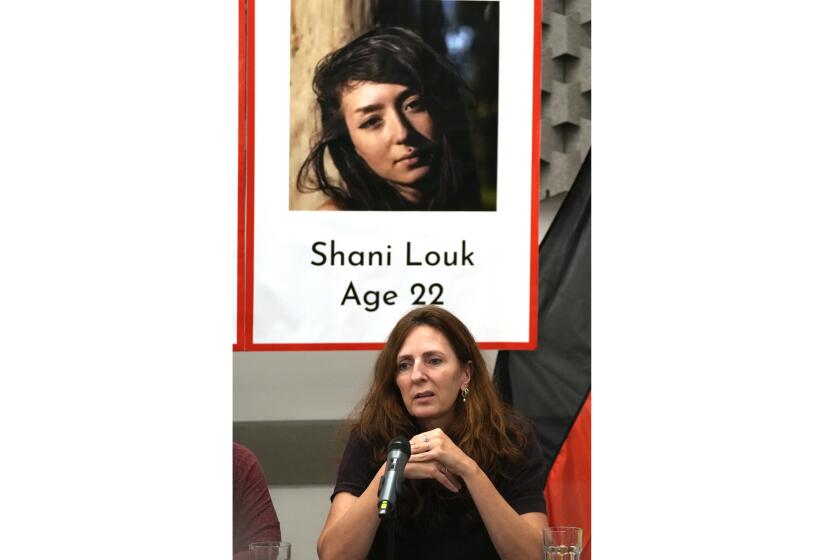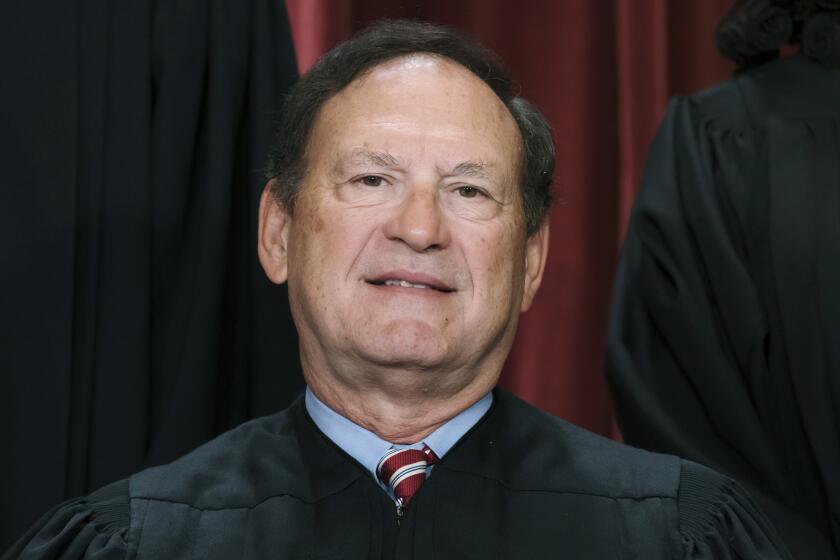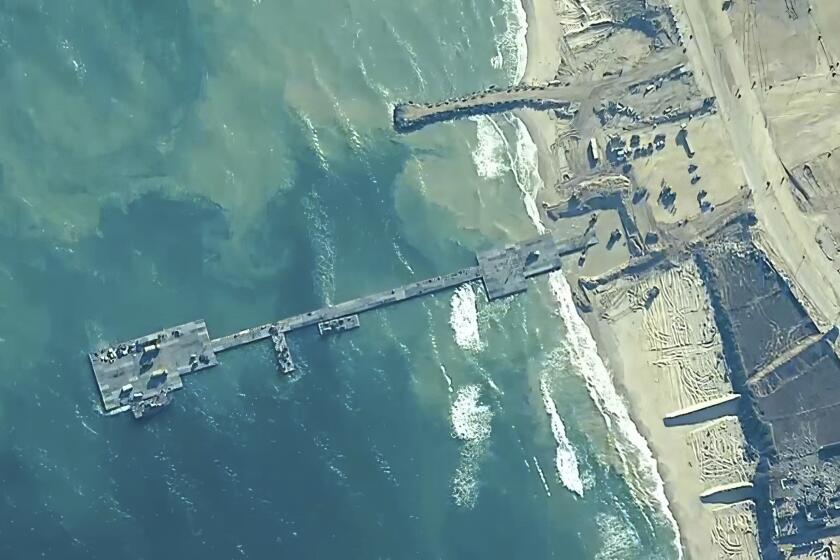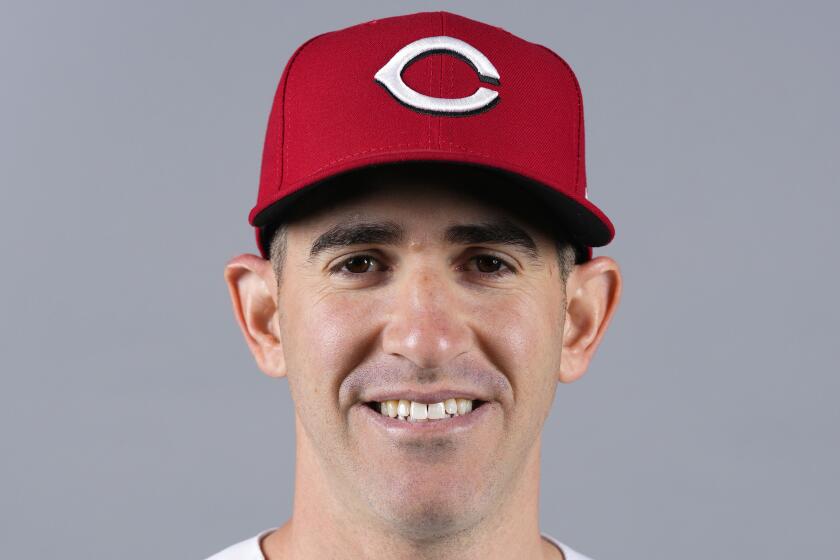At the Outposts, There Is Little Thanksgiving : Military: Away from the hoopla of a presidential visit, a somber holiday seemed to bring lumps to throats of many young American soldiers.
Alone in a sandbagged bunker on a barren desert hill, Army Pfc. Roland Cole spent his Thanksgiving on watch.
In years past, the 20-year-old would have been back in his native Maine, deer-hunting in the snow before a family feast. This autumn, he was to have been newly married, still honeymooning in the Virgin Islands.
But with his world turned upside down by near-war in the Persian Gulf, the young private sat Thursday afternoon peering over a rocky precipice from behind an M-60 machine gun, beginning a two-hours-on, two-off cycle that would fill the holiday night.
“It can get real lonely,” said Cole, whose only taste of Thanksgiving came in a wolfed-down holiday dinner in the subdued mess tent of his artillery unit in the Army’s 1st Cavalry Division.
Away from the hoopla of a presidential visit, a somber holiday in the desert seemed to bring lumps to the throats of many young American soldiers, with any respite from military chores more than consumed by restless thoughts aimed homeward.
A field kitchen in this dusty Army compound was gaily decorated with brightly colored turkey cut-outs, and cooks dished up only the second fresh-cooked meal soldiers in the unit had received since arriving in Saudi Arabia.
But after two months on the lines, most gobbled their dinners in near-silence before wandering back to a tented isolation, with no hope of getting access to a telephone on which they had been offered free three-minute calls home. The phones were miles away.
“It doesn’t matter if you’ve got 1,000 pounds of turkey on the table,” said Pfc. Timothy Summerville, a cook who shook his head as soldiers filed past without a word of thanks. “The only thing that makes a difference is spending Thanksgiving with your loved ones, your children and your wife.”
Lt. Col. Mike Starry, the unit’s executive officer, said soldiers’ moods traversed “peaks and valleys” as they fluctuated over time. On this day, in wistful, homesick talk of missed families and missed celebrations, spirits seemed decidedly low.
“I know I never thought I’d be sitting in a remote van in Saudi Arabia on Thanksgiving Day,” said Pfc. Quincy Lockett, a Chicago-born radioman working a 10-hour shift in a fan-cooled shelter the size of a walk-in closet.
Asked whether he found anything to be thankful for in his deployment to the desert, Lockett, a 19-year-old who plans to attend college when his two-year hitch expires in June, shook his head.
Except for a chance to save money for school, he said emphatically: “Nothing. Nothing. Definitely, nothing.”
From others, there was an uncertain chorus: There had been no war, many said, and for that they were thankful.
But in the two weeks since it became clear that the United States was moving toward offensive options, many said they had come increasingly to worry that the long and boring stalemate would end in a bloody fight.
“A lot of people want war to happen just to get it over with,” said Specialist Eric Nielsen, who, like the young private from Maine, spent much of the day on watch. “But if that happens, a lot of guys won’t come home.
“My father was in the Korean War, and he pretty much explained to me what war was all about,” the 23-year-old continued. “I’d rather not see it.”
With his wife and baby daughter moved back home to Oklahoma from the unit’s base in Ft. Hood, Tex., Nielsen said one thing his father had stressed was that “in war, families get ended.”
“I just want to get home and finish raising my daughter,” Nielsen said. “I didn’t have very much time before I left.”
On the next hill over, Cole, who was to have been married Oct. 20, was experiencing his first Thanksgiving away from Winslow, Me., where, he said, “us men would be out hunting deer and the women would be home, cooking.”
He too was thankful that war had not broken out “before the holidays came.” But however his time here is to end now, he said, perched on a stack of sandbags: “The sooner the better.”
In honor of the day, some soldiers broke into packages from home, sharing canned ham and candy with friends.
Later, there was to be gospel singing and a prayer service--deliberately scheduled to begin after reporters left the camp to minimize coverage of what the public affairs officer, Capt. Jeff Phillips, called “the religion thing” out of concern for their host country’s strict Muslim sensitivities.
“Pretend it’s not happening,” the captain requested initially in an indication of military concern as Christmas and Hanukkah approach in a country that officially recognizes no religion other than Islam.
So removed is this camp from everyday news that several soldiers expressed surprise when told that President Bush, television cameras and satellite dishes in tow, was visiting other units only several score miles away.
Others read and saved a special Thanksgiving message from the President printed inside the menus that accompanied the holiday dinner. But in this desert-weary group there were signs of some uneasiness at its continued talk of war.
“I don’t want a war because a lot of people will die,” said Summerville, the Army cook here. “But whatever President Bush decides I have to back, because he is my boss.”
More to Read
Start your day right
Sign up for Essential California for news, features and recommendations from the L.A. Times and beyond in your inbox six days a week.
You may occasionally receive promotional content from the Los Angeles Times.

